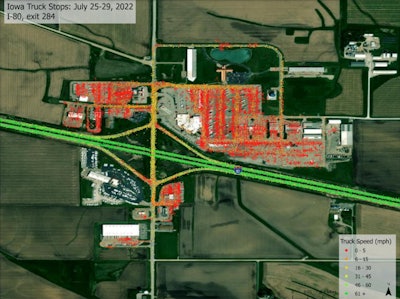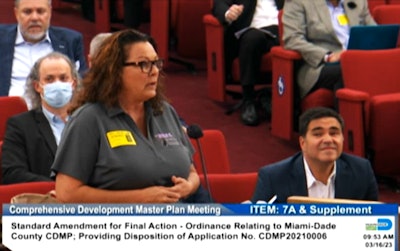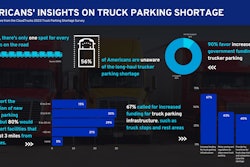Previously in this two-part feature: How drivers are crowdsourcing a solution to the truck parking crisis
"All of a sudden, under this infrastructure bill they got another parking bill. Y’all see any construction besides the highway? Has anybody seen any construction beside the highway?"
The question above was asked by Markcus Davis, a South Carolina-based independent owner-operator, at the Federal Motor Carrier Safety Administration's most recent listening session on broker regulations, at the Mid-America Trucking Show.
Not a single hand in the audience went up.
By some estimates, as noted in the previous part of this series, the search for a place to park costs operators on average about an hour each day and around $5,500 annually. And despite billions in funding from the 2021 infrastructure law meant to improve supply chains and roadway safety, every day many hardworking drivers simply won't find a place to park they'd call safe. Tech companies and apps offer technological solutions to the logistical nightmare of it all -- cameras/sensors monitoring parking spots, feeding data through applications and road signs advertising open spaces to operators. But does "two spots available 30 minutes away" sound helpful?
The truth is, there simply isn't enough truck parking in America. The Owner-Operator Independent Drivers Association estimates there's just one parking spot for every 11 trucks on the road, and existing parking options are under attack. In 2021, the city of Minneapolis effectively banned truck parking, as did Macon in Georgia just this year. When one operator moved to Indian Trails, Florida, in part because he could afford the space to park his rig at home, the local government pulled the rug out under him and others, passing laws that would fine them $1,000 a day for it.
In Henry County, Georgia, armed officers told a driver he couldn't park his truck in his own driveway.
But trucks need to park, and cities need what's on those trucks, even Minneapolis. Eventually, more in the business community beyond driver advocates will be forced to draw their line in the sand on truck parking, to push quite simply for more spaces.
Maybe things have improved since the results shown in the chart were gathered, but maybe not.
There's certainly room -- and money -- for such improvement. To Davis' point, there's a ton of well-publicized cash out there, including $1.1 billion the Biden administration announced for regional Metropolitan Planning Organizations (MPOs) to "improve roadway safety." Some of that could in fact be used for truck parking if a community determined that need. There's $40 million specifically for truck parking in the INFRA grant program for fiscal years 2022-'26.
The DOT even put together a Truck Parking Development Handbook for orgs looking at how to fund new projects.
A slide shown by the North Central Texas Council of Governments MPO during a recent seminar illustrated as much as $45 billion -- yes, with a B -- in federal funds and grants could be tapped for truck parking infrastructure.
Surely help is on the way, right? Sort of.
New truck parking projects under way
So far, the INFRA program, intended to fund major corridor improvements, has granted $15 million to add approximately 120 new truck parking spaces along the I-4 corridor in Florida between Tampa and Orlando, and a $22.6 million grant to add about 125 spaces along I-40 east of Nashville, Tennessee, where a famous truck stop just closed. Missouri is converting two rest stops into truck parking near Dearborn.
Otherwise, experts from academia, industry and government during the NCTCOG seminar pointed to a more robust source of new truck parking projects: Private industry.
"The trend we’re seeing is less smaller independent shops and more bigger name brands" among truck stops building parking, said Mike Johnson of the NCTCOG.
A representative from Love's said the brand "has added almost 400 truck parking spaces this year with new store openings in Jacksonville, Florida; New Boston, Texas; and Lafayette, Indiana, plus a rebuilt location in Gary, Indiana, and that they plan to add another 1,200 before the year is through.
A representative from Pilot Companies noted they planned to add 600 in their networks. TA Petro didn't respond for comment.
 Even at the world's largest truck stop, spaces fill up fast, forcing trucks to park on side roads and exit ramps, where some of the most deadly and costly rear-end collisions are likely to happen. This graphic from ATRI shows where trucks stop (in red) outside of Iowa 80.ATRI
Even at the world's largest truck stop, spaces fill up fast, forcing trucks to park on side roads and exit ramps, where some of the most deadly and costly rear-end collisions are likely to happen. This graphic from ATRI shows where trucks stop (in red) outside of Iowa 80.ATRI
But solving the truck parking problems isn't just a matter of how many spots, but just where those spots are. This is where things get ugly, and Not In My Backyard (NIMBY) politics throws up huge obstacles.
"The easy answer is to build more truck parking," said Chris Oliver, Chief Marketing Officer at Trucker Path. "The tough part is where. Obviously, it's super congested in the Northeast, but get out to Nebraska and there's all kinds of places to park."
Truck parking "operations are being pushed to the periphery of the region, according to our land use analysis," said Johnson, "and we see the same thing with freight infrastructure being pushed further and further out."
With space for trucks in metro areas cramped, people in big cities often object to the noise and polution associated with truck parking. As suburbs grow larger and more dense, and more of the country urbanizes, even traditionally rural areas are pushing out truck stops and freight infrastructure, citing NIMBY concerns.
[Related: Parking: Creative approach meets small-minded resistance in Hutchins, Texas]
"The big problem we face is the NIMBY mentality within local units of government," said Dan Murray, American Transportation Research institute senior vice president. "We drooled over the possibility of not sending trucks to Minneapolis, but one of the biggest issues we have is education for everyone on the criticality of freight. It's five percent of GDP. Everything you have on your body is from a truck. I do see truck parking getting pushed father and farther out, which is problematic because goods are not going to get delivered tomorrow. The concept of free shipping is going to go away."
ATRI also tracks the cost per hour and cost per mile for fleet operations generally, and Murray said it's reached its highest-ever level, and that "truck parking is playing a small role in that."
How to be an effective advocate: 'Humanize the issue'
Defeating NIMBYism around truck parking won't happen overnight.
"Show up at city council meetings," Murray said. "Work with Metropolitan Planning Organizations and state DOTs. ... Educate politicians."
We can all think of snarky and frankly hilarious things to say about politicians and the ways they might get educated by the truck driving public, but the point here is to persuade.
"We need hundreds of thousands of more spaces" in and around urban areas, said Murray. That means a lot of educating in a lot of different city councils, MPOs and the like.
Advocate and operator Desiree Wood, who advocated successfully recently for a new project near the Port of Miami, knows just how difficult it is to talk about the issue when it's not academic. For drivers, parking's an issue of livelihoods, safety and well-being.
On March 16, Wood spoke to the Miami-Dade commissioners meeting and gave them a raw, honest account of her personal experience, balanced out by simple facts.
 Wood is shown here speaking at the commissioners' meeting.
Wood is shown here speaking at the commissioners' meeting.
[Related: Driver held at gunpoint, cargo pilfered: How to avoid being an easy mark in dangerous times]
At the end of the meeting, the commissioners approved a request for truck parking zoning 25 to one, paving the way for 400 new truck parking spots where they're desperately needed. According to Wood, what's also needed is more truck drivers speaking plainly and truthfully about the issues, without falling into the trap of making personal attacks.
"It helps them deal with angry constituents when [those constituents] can explain the issue better, but having an actual truck driver come in person definitely makes an impact," Wood said. "People are changed instantly when a driver can articulate this issue and present themselves appropriately. If we had at least 50 drivers going to all these meetings in every state, we would make real progress."
With a piece of parking legislation in both houses of Congress right now that would add $755 million in federal funding to the parking pie if passed, Wood suggested additional funding won't go where it's needed without direct engagement from those who know the issue best. "We have plenty of money for truck parking" at the present moment, she said. "We have state DOTs studying it as a requirement and [who] know this issue, but at the local level we lack education and advocates who can get the point across to humanize the issue in less than five minutes."
In the Miami case, getting the zoning request granted also took some political savvy, with the application calling the facility a "terminal" rather than simply a truck stop or truck parking, though it's not a specific terminal for a single fleet.
"Right now it's mostly residential opposition against developers," Wood added, "and no one is there to humanize the issue. That is what is lacking the most."
[Related: How owner-operators can fight back in the war on truck parking]










